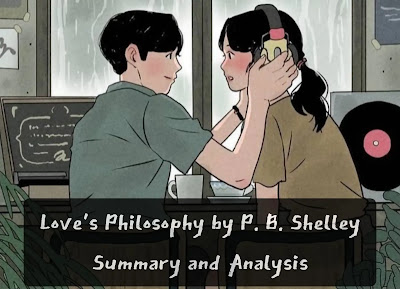Also Read
LOVE'S PHILOSOPHY
Text
IThe fountains mingle with the riverAnd the rivers with the Ocean,The winds of Heaven mix for everWith a sweet emotion;Nothing in the world is single;All things by a law divineIn one spirit meet and mingle.Why not I with thine?—IISee The mountains kiss high HeavenAnd the waves clasp one another;No sister-flower would be forgivenIf it disdained its brother;And the sunlight clasps the earthAnd the moonbeams kiss the sea:What is all this sweet work worthIf thou kiss not me?
SUMMARY & ANALYSIS
INTRODUCTION
Love's Philosophy, composed probably late in 1819, was published in Leigh Hunt's journal, The Indicator, on 22nd December in the same year. Out of those written for Miss Sophia Stacey (see Introduction to the The Indian Serenade), this poem may have been suggested by certain passages in Plato's Symposium which Shelley translated in 1818. The following words from Agathon's speech in praise of Love in the Symposium may be quoted from Shelley's own translation: "And who will deny that the divine poetry, by which all living things are produced upon earth, is not harmonized by the wisdom of love.....Love is the divinity who creates peace among men, and calm upon the sea, the windless silence of storms, repose and sleep in sadness. Love divests us of all alienation from each other, and fills our vacant hearts with overflowing sympathy."
SUMMARY
The poet seeks to mingle his soul with that of his beloved. He takes up the plea of the universal law of love that unites the fountains with the rivers, the rivers with the sea, the mountains with high heaven, and the waves with one another; the flowers male and female unite, the sunlight embraces the earth, the moonlight touches the sea; why then will not the lover unite with his beloved?
LI. 1-8. The fountains mingle.....I with thine? The poet tries to explain the urge of his union with his beloved. He draws examples from nature itself: the fountain water mixes with the river which in turn falls into the ocean and becomes one with it. The blowing winds of the sky are attracted towards each other and are united in joy and emotion. Hence the poet says that nothing in the world is single and isolated and all things long to be united. This is the divine law and so the poet feels that it is natural that he should be united with his heaved and requests his beloved not to resist his union with her.
LI. 9-16. See the mountains.....kiss not me. The poet emphasizes the need of his union with the beloved by giving more instances of natural objects' union with one another. He points out that the mountains soar into the sky as if making an attempt to kiss it; the waves of the ocean lovingly run into one another's embrace; the flowers, in breeze, move and appear to kiss each other; the sister flower is never pardoned by Nature if it hesitates to mingle with other brother flowers. The sun beams down embraces on the earth and the moon kisses the rising tides of the ocean. Thus all natural objects embrace the divine law and become united. But all these unions lose their worth and become nothing if his own love is not requited by his beloved.
CRITICAL APPRECIATION AND ANALYSIS
Concept of Love: Shelley's concept of love, as it is expressed in Love's Philosophy is borrowed from Plato. He shares Plato's view that love is a unifying principle governing the laws of Nature; it rules over all things, divine and human. The poet mentions a few natural phenomena—the fountains mingling with the river, and the rivers with the ocean, the winds mixing with each other, the mountains kissing the sky, the waves mingling with each other, the sunlight touching the earth, and the moonbeams kissing the sea—to show that nothing in this world can exist without an association with certain other things:
Nothing in the world is single,All things by a law divineIn one another's being mingleWhy not I with thine?
This universal tendency of everything to mingle with others is explained by the poet as the result of an unassailable harmony created by an all-pervading bond of love. Shelley once again reiterated the theme of Platonic concept of love in this poem.
A Trifle Though Lyrical: Love's Philosophy is certainly not one of the best poems of Shelley. In spite of its high-sounding title, it has no deep philosophy in it. The poet has tried to show the existence of an all-unifying bond of love behind everything through examples of some natural phenomena. But his examples are unconvincing and not thought-provoking. The poem has, of course, sound lyrical qualities. The simplicity of thought and diction, spontaneity of expression and a skillful use of meter have lent the poem the musical quality, typical of Shelley's other lyrics. Apart from its lyrical quality the poem has nothing remarkable about it.
ANNOTATIONS
L. 1. mingle—merge; become one. L. 4. sweet sweet emotion; sweet passion, Love. L. 6. law - spiritual principle. L. 7. being—existence; life. L. 8. thine—the beloved's soul. L. 9. high heaven—sky. L. 10. clasp—embrace, encircle. L. 11. forgiven—pardoned. L. 12. disdain'd— hated, despised. LI. 11-12. No sister....brother—one peculiarity of Shelley's poetry is that he makes poetic use of scientific facts. Here he refers to the sex of the flowers: the pollen must fertilize the ovules. L. 14. moonbeams kiss the sea—on full moon nights, the tides rise very high as though to meet and kiss the moon. L. 15. What are all worth? What is the purpose behind such acts of kissing and attracting? L. 16. If thou....me—The poet says that if his beloved does not respond to his love by kisses, the tokens of love exchanged by nature are worth nothing.
